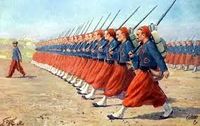Annotation:Zouave Quick Step: Difference between revisions
(Created page with "=='''Back to [[{{BASEPAGENAME}}]]'''== ---- <p><font face="garamond, serif" size="4"> '''ZOUAVE QUICK STEP'''. American, Quickstep (2/4 time). D Major (‘A’ part) & G Majo...") |
m (Text replacement - "garamond, serif" to "sans-serif") |
||
| (One intermediate revision by one other user not shown) | |||
| Line 1: | Line 1: | ||
=='''Back to [[{{BASEPAGENAME}}]]'''== | =='''Back to [[{{BASEPAGENAME}}]]'''== | ||
---- | ---- | ||
<p><font face=" | <p><font face="sans-serif" size="4"> | ||
'''ZOUAVE QUICK STEP'''. American, Quickstep (2/4 time). D Major (‘A’ part) & G Major (‘B’ and ‘C’ parts). Standard tuning (fiddle). AABBCC. From the manuscripts of Setauket, Long Island, painter and fiddler William Sidney Mount, on a page headed by the note “From Anderson Hood – his band – June.” The year is probably 1863, as a tune at the bottom of the page, written at a different (presumably later) time, is dated August, 1863. A zouave in this context was a Civil War era soldier whose unit was patterned after the French zouaves, a name derived from the Zouaoua, a fiercely independent Kabyli tribe living in the rocky hills of Alegeria and Morroco. Although the original colonial units were comprised of members of this tribe and other North Africans, the zouaves became increasingly comprised of native Frenchmen. However, the distinctive uniform was retained, patterned after traditional North African dress. The zouaves were a well-trained and a spectacularly effective fighting force, which (along with the lure of those natty uniforms!) is why they were imitated by American units prior to and during the beginning of the Civil War. | '''ZOUAVE QUICK STEP'''. American, Quickstep (2/4 time). D Major (‘A’ part) & G Major (‘B’ and ‘C’ parts). Standard tuning (fiddle). AABBCC. From the manuscripts of Setauket, Long Island, painter and fiddler William Sidney Mount, on a page headed by the note “From Anderson Hood – his band – June.” The year is probably 1863, as a tune at the bottom of the page, written at a different (presumably later) time, is dated August, 1863. | ||
[[File:zouave.jpg|200px|thumb|left|]] | |||
A zouave in this context was a Civil War era soldier whose unit was patterned after the French zouaves, a name derived from the Zouaoua, a fiercely independent Kabyli tribe living in the rocky hills of Alegeria and Morroco. Although the original colonial units were comprised of members of this tribe and other North Africans, the zouaves became increasingly comprised of native Frenchmen. However, the distinctive uniform was retained, patterned after traditional North African dress. The zouaves were a well-trained and a spectacularly effective fighting force, which (along with the lure of those natty uniforms!) is why they were imitated by American units prior to and during the beginning of the Civil War. | |||
<br> | <br> | ||
<br> | <br> | ||
</font></p> | </font></p> | ||
<p><font face=" | <p><font face="sans-serif" size="4"> | ||
''Source for notated version'': William Sidney Mount music manuscirpts (Long Island, mid-19th century). | ''Source for notated version'': William Sidney Mount music manuscirpts (Long Island, mid-19th century). | ||
<br> | <br> | ||
<br> | <br> | ||
</font></p> | </font></p> | ||
<p><font face=" | <p><font face="sans-serif" size="4"> | ||
''Printed sources'': | ''Printed sources'': | ||
<br> | <br> | ||
<br> | <br> | ||
</font></p> | </font></p> | ||
<p><font face=" | <p><font face="sans-serif" size="4"> | ||
''Recorded sources'': <font color=teal></font> | ''Recorded sources'': <font color=teal></font> | ||
</font></p> | </font></p> | ||
Latest revision as of 14:48, 6 May 2019
Back to Zouave Quick Step
ZOUAVE QUICK STEP. American, Quickstep (2/4 time). D Major (‘A’ part) & G Major (‘B’ and ‘C’ parts). Standard tuning (fiddle). AABBCC. From the manuscripts of Setauket, Long Island, painter and fiddler William Sidney Mount, on a page headed by the note “From Anderson Hood – his band – June.” The year is probably 1863, as a tune at the bottom of the page, written at a different (presumably later) time, is dated August, 1863.

A zouave in this context was a Civil War era soldier whose unit was patterned after the French zouaves, a name derived from the Zouaoua, a fiercely independent Kabyli tribe living in the rocky hills of Alegeria and Morroco. Although the original colonial units were comprised of members of this tribe and other North Africans, the zouaves became increasingly comprised of native Frenchmen. However, the distinctive uniform was retained, patterned after traditional North African dress. The zouaves were a well-trained and a spectacularly effective fighting force, which (along with the lure of those natty uniforms!) is why they were imitated by American units prior to and during the beginning of the Civil War.
Source for notated version: William Sidney Mount music manuscirpts (Long Island, mid-19th century).
Printed sources:
Recorded sources:
